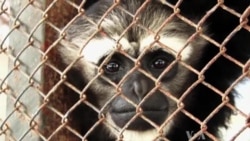BANGKOK —
Thai and American officials are reporting progress in a combined effort to curb the global trade in illicit wildlife. But they say the problem is growing because of increased demand worldwide for endangered animals and lucrative parts of their bodies.
Thai authorities are trying to make a dent in what has become a multibillion dollar illicit business, taking endangered animals from their natural habitats and selling them or parts of them on the black market.
For the past several years, Thailand has had ally on the law enforcement front to combat the trade, the United States government.
A key official on the American side is William Brownfield, the State Department's assistant secretary responsible for the global fight against illegal drugs and organized crime, who investigates, arrests, prosecutes and incarcerates illicit traders.
“Illegal wildlife traffickers are definitely criminals," Brownfield said.
Thai authorities say they forecast a total seizure this year of 20,000 live animals, a number that has been increasing in recent years in Thailand and other countries.
Increased demand, in part from wealthier customers in Asia, is creating a larger market, said Brownfield.
"The larger number of seized and confiscated wildlife shows, as well, that law enforcement is beginning to work," he said.
One of the biggest concerns for authorities here is that Thailand is being used as a shipping point, especially for ivory. A single elephant can be worth up to $30,000.
Cooperation with the United States has become a key factor in reducing wildlife trafficking and sales of related illicit products, said Theerapat Prayurasiddhi, the deputy director general of Thailand's national parks.
"It's a worldwide problem due to poverty, greed and people who want to exploit natural resources for their own benefit," he said. "This results in the increase in wildlife trafficking and we must pursue a global solution."
But even pursuing a regional solution in Southeast Asia is proving to be a big challenge. The kingpins of the trafficking have proven to be untouchable, so far. Honest officers say they are stymied by corrupt counterparts and a lack of sharing of intelligence, among different agencies, let alone across borders.
Thai authorities are trying to make a dent in what has become a multibillion dollar illicit business, taking endangered animals from their natural habitats and selling them or parts of them on the black market.
For the past several years, Thailand has had ally on the law enforcement front to combat the trade, the United States government.
A key official on the American side is William Brownfield, the State Department's assistant secretary responsible for the global fight against illegal drugs and organized crime, who investigates, arrests, prosecutes and incarcerates illicit traders.
“Illegal wildlife traffickers are definitely criminals," Brownfield said.
Thai authorities say they forecast a total seizure this year of 20,000 live animals, a number that has been increasing in recent years in Thailand and other countries.
Increased demand, in part from wealthier customers in Asia, is creating a larger market, said Brownfield.
"The larger number of seized and confiscated wildlife shows, as well, that law enforcement is beginning to work," he said.
One of the biggest concerns for authorities here is that Thailand is being used as a shipping point, especially for ivory. A single elephant can be worth up to $30,000.
Cooperation with the United States has become a key factor in reducing wildlife trafficking and sales of related illicit products, said Theerapat Prayurasiddhi, the deputy director general of Thailand's national parks.
"It's a worldwide problem due to poverty, greed and people who want to exploit natural resources for their own benefit," he said. "This results in the increase in wildlife trafficking and we must pursue a global solution."
But even pursuing a regional solution in Southeast Asia is proving to be a big challenge. The kingpins of the trafficking have proven to be untouchable, so far. Honest officers say they are stymied by corrupt counterparts and a lack of sharing of intelligence, among different agencies, let alone across borders.










